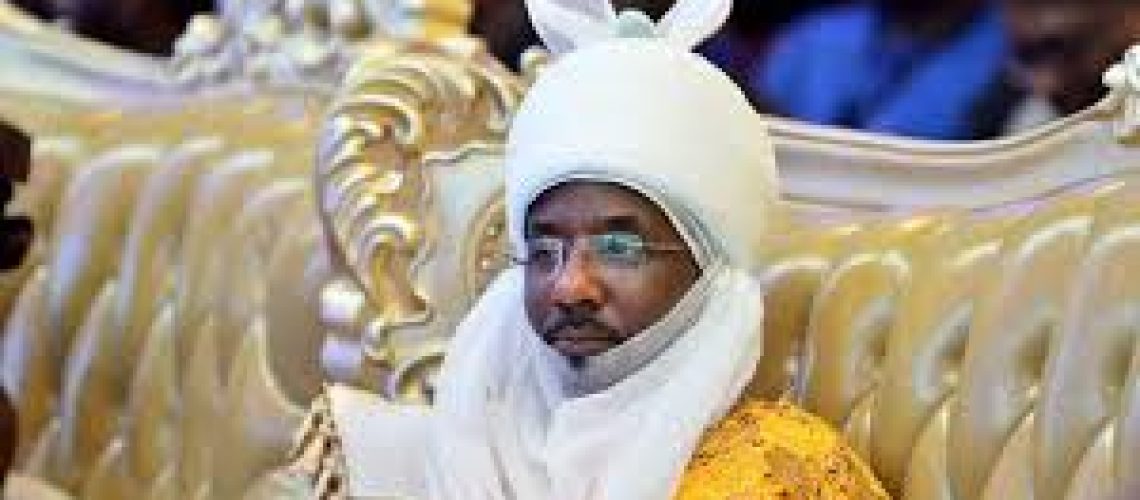What is happening in Kano between the crown and the state, since 2017, is not because of who governor Abdullahi Umar Ganduje is. It is rather because of what type of Emir, Muhammadu Sanusi II (MSII), is. You are likely to always support MSII, if only you like what type of Emir he is, regardless, of who the governor, at any point in time, is.
The governor could have been Abba K. Yusuf aka Abba Gida Gida or the spitting image of the onetime 1999-2003 and 2011-2015 progressive and realist governor, Rabiu Kwankwaso or whoever you may imagine put there, during the 2019 elections. MSII will always disagree with him because, like some of us, MSII, likes making public commentary with policy alternatives to what a governor or a president wants.
And governors or presidents, can accommodate that from ordinary folks like us, but cannot, from a person too important as a first class Emir from the old Sultanate. Therefore, it is akin to postponing the evil day; If Gov. Abdullahi Umar Ganduje did not make any move to humiliate MSII now, another will do exactly the same in future, but maybe in a different way.
This has been the tradition right from the colonial era. The Nigerian colonial and post-colonial nation and its sub-national units have never had a heart large enough to accommodate any Emir from the old Sultanate of Northern Nigeria, who had or has alternative policy conceptions on administration or governance, and muster the courage to voice them out
.
Was it Attahiru I of Sokoto and Aliyu Babba of Kano whom the colonialists fought and defeated; Kwasau of Zazzau or his successor, Aliyu Dan Sidi, whom they dethroned and exiled; Muhammadu Sanusi I of Kano or Ado Bayero – who was chosen to be a second replacement of Muhammadu Sanusi I – who still had to be fought by the Nigerian structure of the second republic.
Ado Bayero is also seen today as being a direct opposite of MSII and the crime of MSII is said, in some quarters, to be inability to behave like him. Of course a contradiction! The others in recent memory are Jokolo of Gwandu that Nigerian President Obasanjo was actively interested in dethroning during the first years of the fourth republic and Sultan Dasuki with the Nigerian Head of State, General Sani Abacha, during the last experiment with military dictatorship, 1993-98.
The truth of the matter is Nigeria and its sub-national units have always felt threatened by the Northern Sultanate Emirates as institutions, over the approximately one century of its existence.
In fact it is a miracle today that Nigeria has not been able to muster the courage to obliterate the Emirates, completely, despite the over a century old effort to constantly humiliate the Emirs at any slight opportunity. The 1976 Dasuki Committee on Local Government Reforms, under the military rule of General Murtala Mohammed, stripped them of any formal constitutional role further reducing them to reporting to mere Local Government Chairmen.
Why Nigeria has not achieved total emasculation of the Emirs should be an interesting research problem of some accomplished academics. But casual observations are likely to suggest that maybe the institutions of the Emirates are the best representative of the essence of these communities and the sum total of their genuine aspirations.
Since after the aforementioned 1976 reforms, events, turns and currents of the collective social negotiation processes in the North have always put the Emirs, more than any others, as the centre. Here in Zaria, while growing up in the 80s, there was not a Nigerian military head of state or civilian President that I can’t recall respectfully visiting the Emir for support and as a form of further legitimatizing their rule through being seen to have secured the endorsement of the Emirate and the Emir.
Maybe it is why the Nigerian presidents or governors get easily rattled by an outspoken Emir with direct suggestions on policy alternatives. His advises maybe actually representing the true yearning of the people and could cost Nigeria much of its value in the eyes of the masses or even instigate revolution that some quarters may consider undesirable.
Moreover the masses in the North always find it easy to see the Emirs and the Emirates as first ports of heaping complaints and blames when anything goes wrong in their socio-cultural life. Case in point is the 2011 elections when they felt cheated in the presidential elections results that did not make it possible for the now President Muhammadu Buhari, then, to be declared the winner all over the country. The first target of their anger and frustrations, in both Kaduna and Kano, were the palaces of the first class Emirs of the Sultanate. They visited them with heavy violence!
All these have the capacity to inevitably lead a concerned mind about the fate of the people of Northern Nigeria, to start asking as to whether the range of problems bedeviling the region today, is in the failure of the Nigerian nation structures, to come to terms with the reality of achieving a harmoniously synchronous relationship with the Emirates and the Emirs in their statuses as always free, conscientious and independently vocal development partners. Not the role it always wants to impose on them of passive partnership or a yes-men subordinates.
This is the fourth republic. The longest experiment we ever had with democracy whose cardinal principle is, “what truly people want is what politicians in government will do if they want to live in peace with a polity”. The North is sitting on a very rich history and abundant cultural heritage. The North seem to want its much needed but elusive development delivered via the vehicle of its cultural memory through the agency of the Emirates and Emirs. This can be said to be what the Emir of Kano Muhammadu Sanusi II long realised and is ready to put to the highest functional use in the salvation of his people.
Probably that also is why almost everywhere from northwest, north central and northeast, almost everybody feels bruised whenever a first class Emir is involved in an unnecessary joust. Even in the era of social media it will not be reckless to submit that the Emirs pull more of self-appointed defenders and advocates when they are taken to public courts on any matter.
Therefore, it is high time that the present Nigerian national structure at both federal and state levels started thinking of how it can widen the reach and influence of Emirs and Emirates in the North. And properly exploit their cultural legitimacy, knowledge base, creative acumen, coherence and several windows of social alignments as the head crowd movers in the region; towards bringing the much needed, long awaited development to the region that Nigeria dearly wants to see.
It is also when we look at the developments in Kano, last week in these lights, that we will truly appreciate them as anti-progress and anti-people, at a time when the whole Northern Nigeria is hanging on the precipice and need urgent measures to a rescue.
NOTE: Governor Ganduje, in a move typical of political manoeuvre in the guise of governance of genuine concern, last week, oversaw the urgent breaking of recess and reconvening of the Kano State House of Assembly, to read and pass a bill that saw the division of the historical Kano Emirate into five independent Emirates for his immediate assent.

